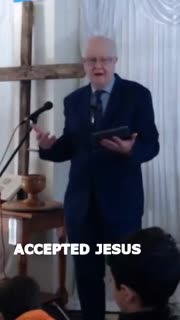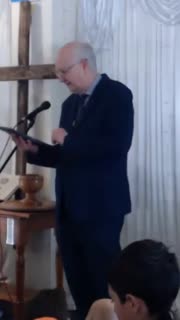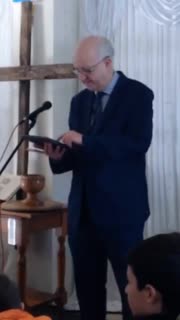Discerning Leadership and Understanding Sin in Faith
Devotional
Sermon Summary
Bible Study Guide
Sermon Clips
### Quotes for Outreach
1. "If we have accepted Jesus Christ as our Lord and Savior, we know we've been saved, right? And we know we've been saved. And we know we've been saved from our sin. But the problem is that we still sin. Most of us didn't achieve that marvelous state of Christian perfection the moment that we accepted Jesus as our Lord and Savior. Most of us have still yet to get to that point where we choose not to sin, and more importantly, don't." [53:14] (33 seconds)
2. "Get into the habit of telling him you're really sorry for whatever you have done. Ask him for his forgiveness. Thank him that he has forgiven you. Ask for his help not to sin again. And then leave it with him. Knowing that he's not only forgiven you, but he's forgotten that you even sinned. And do the same for yourself. Forgive yourself. And put that sin out of your mind." [58:49] (34 seconds)
3. "Above all, let's be thankful that we have a, that we worship a God who knows all of our weaknesses and is prepared to forgive us when we do wrong and not only forgive us, but forget that we did it. A God who washes his hands of our sin. Amen." [01:01:12] (22 seconds)
### Quotes for Members
1. "So if we put all these together, we can say that sin is when we deliberately or voluntarily do things we know make God sad or angry. That's not good, eh? You don't like being sad? You don't like being sad, do you? It separates us from him and often hurts us and others. Now, if we think about it, that's a long list of things, potentially." [45:56] (30 seconds)
2. "Is it possible for us never to sin? Yes. And not just in heaven. It's possible not to sin here on earth. This is what we call Christian perfection, where we have the power over sin. Something that John Wesley concluded was possible from his reading of 1 John 3.9 and Romans 6. 1 John 3.9 says this, Those who have been born into God's family, do not make a practice of sinning because God's life is in them. So they can't keep on sinning because they are children of God." [49:13] (38 seconds)
3. "We get there by confessing our sins, and so we come to this week's spiritual practice. Now, here, when you read your companion guide, you will see that the spiritual practice we are being introduced to and invited into this week is confession. That's great. We are invited to confess our sins to a trusted believer, based on James 5, verse 16. Therefore, confess your sins to each other and pray for each other so that you may be healed. The prayer of a righteous person is, But I'm convinced that this is not how the practice of confession should be carried out." [54:51] (52 seconds)
4. "Firstly, there is no time restriction on confessing our sins to God and on receiving his forgiveness. We can do it at any time for anything we've knowingly done, which is made up of our sins. We can do it at how long ago we did it. And in fact, the more we practice confessing our sins to God, the more he will bring to mind, because he knows how confessing our sins to him releases us from guilt and shame." [01:01:12] (39 seconds)
5. "And so the practice I'm inviting you to work on this week is confession to God. Get into the practice of confessing your sins to God as soon as you realize you have sinned. No matter where you are or who you are. You don't have to say it out loud. God hears our thoughts when we direct them to him. In fact, he hears them when we don't direct them to him. But when we direct our thoughts, we can pray." [57:42] (30 seconds)
Ask a question about this sermon
1. "If we have accepted Jesus Christ as our Lord and Savior, we know we've been saved, right? And we know we've been saved. And we know we've been saved from our sin. But the problem is that we still sin. Most of us didn't achieve that marvelous state of Christian perfection the moment that we accepted Jesus as our Lord and Savior. Most of us have still yet to get to that point where we choose not to sin, and more importantly, don't." [53:14] (33 seconds)
2. "Get into the habit of telling him you're really sorry for whatever you have done. Ask him for his forgiveness. Thank him that he has forgiven you. Ask for his help not to sin again. And then leave it with him. Knowing that he's not only forgiven you, but he's forgotten that you even sinned. And do the same for yourself. Forgive yourself. And put that sin out of your mind." [58:49] (34 seconds)
3. "Above all, let's be thankful that we have a, that we worship a God who knows all of our weaknesses and is prepared to forgive us when we do wrong and not only forgive us, but forget that we did it. A God who washes his hands of our sin. Amen." [01:01:12] (22 seconds)
### Quotes for Members
1. "So if we put all these together, we can say that sin is when we deliberately or voluntarily do things we know make God sad or angry. That's not good, eh? You don't like being sad? You don't like being sad, do you? It separates us from him and often hurts us and others. Now, if we think about it, that's a long list of things, potentially." [45:56] (30 seconds)
2. "Is it possible for us never to sin? Yes. And not just in heaven. It's possible not to sin here on earth. This is what we call Christian perfection, where we have the power over sin. Something that John Wesley concluded was possible from his reading of 1 John 3.9 and Romans 6. 1 John 3.9 says this, Those who have been born into God's family, do not make a practice of sinning because God's life is in them. So they can't keep on sinning because they are children of God." [49:13] (38 seconds)
3. "We get there by confessing our sins, and so we come to this week's spiritual practice. Now, here, when you read your companion guide, you will see that the spiritual practice we are being introduced to and invited into this week is confession. That's great. We are invited to confess our sins to a trusted believer, based on James 5, verse 16. Therefore, confess your sins to each other and pray for each other so that you may be healed. The prayer of a righteous person is, But I'm convinced that this is not how the practice of confession should be carried out." [54:51] (52 seconds)
4. "Firstly, there is no time restriction on confessing our sins to God and on receiving his forgiveness. We can do it at any time for anything we've knowingly done, which is made up of our sins. We can do it at how long ago we did it. And in fact, the more we practice confessing our sins to God, the more he will bring to mind, because he knows how confessing our sins to him releases us from guilt and shame." [01:01:12] (39 seconds)
5. "And so the practice I'm inviting you to work on this week is confession to God. Get into the practice of confessing your sins to God as soon as you realize you have sinned. No matter where you are or who you are. You don't have to say it out loud. God hears our thoughts when we direct them to him. In fact, he hears them when we don't direct them to him. But when we direct our thoughts, we can pray." [57:42] (30 seconds)








